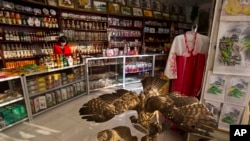South Koreans may soon be able to vacation with long-lost family members in North Korea, according to a new proposal by Seoul — as long as the plan is approved by Pyongyang and overcomes obstacles related to U.S.-led sanctions.
South Korea’s unification ministry recently announced it was considering allowing citizens to make individual tours to North Korea, including possible hometown visits by members of South Korean families divided by the 1950s Korean War.
That would be welcome news for many of the nearly 53,000 South Koreans who are registered as separated family members and who have been unable to see or even talk to their loved ones for decades, in many cases.
Peter Ward, who writes about the North Korean economy for NK News, said the humanitarian benefits of the tourism plan were “self-evident,” but he doubted the United States would approve of Seoul’s idea amid a breakdown in nuclear negotiations.
'Bad message'
“I’m not sure whether the U.S. State Department would shoot it down outright, but I think that, from Washington’s perspective, it does send a bad message,” Ward told VOA. “I think it can be seen as rewarding North Korea for bad behavior.”
The last formal reunion for divided families was held in August 2018, but plans for future meetups have been brushed aside amid stalled nuclear talks with Pyongyang.
International sanctions remain a hurdle for most of South Korean President Moon Jae-in’s plans involving economic cooperation with North Korea, but the unification ministry’s “individual tourism” idea would conveniently fall in a loophole. Tourism itself is not subject to sanctions, and Kim Jong Un has been busy building major tourist facilities such as the Yangdok Hot Spring Cultural Recreation Center and the Samjiyon “utopia town.”
But there are sanctions-related concerns. Earlier this month, Harry Harris, the U.S. ambassador to South Korea, called for Seoul to consult with the U.S. about the tourism proposal to avoid “misunderstandings” related to sanctions.
Complicating factor
Part of the problem is that tourism could complicate sanctions enforcement. South Koreans bringing cameras, smartphones or other personal items into North Korea might be seen as a sanctions violation.
Lee Sang-min, spokesperson for the Ministry of Unification, pushed back against Harris’ concerns at a press briefing on January 17, stating, “Our policy with regard to North Korea belongs to our sovereignty.”
“The Moon government is looking for any angle to engage North Korea that is both palatable to Pyongyang and possible under existing sanctions. This includes a proposed joint Olympics bid and restarting tourism on an individual basis,” Leif-Eric Easley, an associate professor of international studies at Ewha Womans University in Seoul, told VOA. “North Korea has a history of receptiveness to sports diplomacy and Kim Jong Un is betting on tourism as a new revenue stream.”
When it comes to separated family members, time is running out — an estimated 3,147 South Koreans registered as separated family members died between January and November 2019, and an estimated 63.4% of those still alive are age 80 or older, according to Yonhap News.
Even so, South Korea has several obstacles to overcome before individual tourism can happen. It would first have to amend its domestic law, which currently bans citizens from traveling North without a formal invitation from a North Korean organization or government body — which the Minister of Unification then must approve. North Korea would also have to agree to issue visas to South Korean travelers, adding another layer of complications.
2008 incident
Troubles aside, experts like Ward still believe that pursuing individual tourism would be worthwhile for Seoul and Pyongyang — despite the dangerous track record. In 2008, a North Korean soldier shot and killed a 53-year-old South Korean tourist who walked into a restricted area at the Mount Kumgang resort, eventually leading to a tourism ban.
“The benefit for the North Korean regime would be real. They would receive some money from these visits, one way or another. They’ll make sure they get their cuts,” Ward said. “For the people who want to promote change in North Korea, the best thing you can do is have lots of South Koreans going to major North Korean cities, staying at hotels and interacting with the local serving staff at restaurants. Seeing is believing, and seeing lots of well-fed, visibly wealthier South Koreans — even on a small scale — will have an effect on many North Koreans.”








